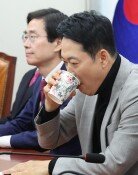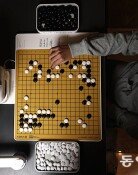New Uri Floor Leader Chun Jung-bae Believes in Party-Centered Policy
New Uri Floor Leader Chun Jung-bae Believes in Party-Centered Policy
Posted May. 12, 2004 22:37,
The election of Rep. Chun Jung-bae as the Uri Party floor leader on a party-centered reformist ticket has heightened tensions within and outside the party. Most of all, what is inevitable is a new alignment of relations between the Uri Party, the presidential office and the government, between the ruling and opposition parties, as well as between the mainstream and non-mainstream in the Uri Party. Once he is geared toward working on his election pledges, it will likely cause further tension and conflict in and out of the party.
Party-Government Relations
Rep Chuns party-centered policy has a long history. In August of last year when the Uri Party was yet to be formed, he said, I am still considering whether the new party [the Uri Party] should be a ruling party or an opposition party. He continued, It should not be a ruling party or an opposition party that criticizes the government. Rep. Chun concluded, The party should lead the presidential office and the government. It should play a leading role in the Roh Moo-hyun government with a vision of government administration.
This context explains why Rep. Chun and Rep. Hong Jae-hyong, the partys policy commission chair, lambasted the Ministry of Finance and Economy at a policy coordination meeting with the government on May 12, one day after the election of the floor leader.
His party-centered policy borders on political philosophy. Although it wont cause tension between the party and the government immediately, there is a clear gap in consciousness between Rep. Chuns policy and the presidential offices attempts at enforcing presidential power. It will complicate President Rohs efforts to encourage the Uri Partys presidential hopefuls to take a post in the Cabinet and to use Moon Hee-sang, his political envoy, as a go-between in the coordination of the party and the government.
The presidential offices concerns about Chuns intransigence were behind the rumors claiming that the presidential office preferred Rep. Lee Hae-chan, the other candidate, as floor leader. There will be much dialogue through regular weekly meeting [between the president and Rep. Chun], a person close to Rep. Chun said. There is little difference in the view between President Roh and Rep. Chun.
Relations with the Opposition Party
Rep. Chun has made it clear that the Uri Party should work on enlivening the economy and political reforms simultaneously. While it puts efforts into improving the livelihood of the public, the ruling party should put reforms of the press and the issue of the National Security Law on the agenda whenever it can. This sets his policy priority apart from Uri Party Chair Chung Dong-youngs emphasis on reforms and the Grand National Partys prioritizing of the enlivening of the economy. It is the flash point where the ruling partys relations with the opposition party may run into difficulties.
The elimination of the post of the presidential political affairs secretary may cause an adverse impact as it will also eliminate a behind-the-scenes window of negotiation the presidential office can use at times of pitched political confrontation.
It appears that President Roh has tilted toward the enlivening of the economy in his policy priority. The presidents attempts to appoint Kim Hyuk-gyu, his economic adviser who staunchly gives precedence to the economy, coupled with his new policy priority leaked by people who met President Roh recently, will add to debate in the Uri Party, depending on how Rep. Chun will map out his reformist policy.
Mainstream vs. Non-main stream
While a clear line has yet to be drawn between the mainstream and the non-mainstream in the Uri Party, how Rep. Chun will politically embrace 72 Uri Party lawmakers is another variable in the power equation of the party. He will likely have uneasy relations with the partys stalwarts in that they supported Rep. Lee in the floor leader election.
There is no fraction in the party, Rep. Chun declared on May 11. We will show what fairness and transparency mean when we select National Assembly committee chairs and allocate lawmakers for the committees, one of his aides said.
However, as Rep. Chun has made it clear that he will use the capability of lawmakers, not the number of terms they have served, as criteria in allocating them to the committees. This will cause conflict between him and stalwarts. Rep. Chun reportedly has plans to encourage committee members to elect their chairs in the National Assembly, instead of being installed by the party.
Young-Chan Yoon Yong-Gwan Jung yyc11@donga.com yongari@donga.com





![[오늘의 운세/2월 27일]](https://dimg.donga.com/c/138/175/90/1/wps/NEWS/IMAGE/2026/02/26/133425477.1.jpg)
![[사설]계엄 때보다 낮은 지지율 17%… 국힘의 존재 이유를 묻는 민심](https://dimg.donga.com/c/138/175/90/1/wps/NEWS/IMAGE/2026/02/26/133433702.1.jpg)
